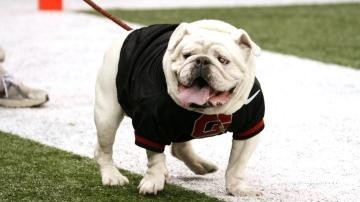ATHENS - The British Kennel Club plans to change the look of the bulldog the University of Georgia's iconic mascot for a newer, sleeker and healthier breed.
But the decree across the Atlantic cuts no ice with the owners of the Uga line of bulldogs revered by Georgia fans here and across the sea.
"I don't care what the British do,'' said Sonny Seiler, owner of the bulldog line that has become the most celebrated sports mascot in the United States.
Critics in England and in the United States say breeders have transformed bulldogs and some other dog breeds into genetic monstrosities prone to chronic disease and sometimes early death.
A BBC documentary in August detailed the illnesses that bulldogs and other breeds are prone to because of the way they've been bred to look. The British TV network also announced it would no longer televise England's premier dog show, where dogs are judged against standards of appearance and behavior that the British Kennel Club defines as ideal.
The kennel club subsequently announced it would review breed standards in the light of the animals' health, and has unveiled new standards for more than 200 dog breeds including the bulldog, which will have longer legs, a trimmer torso, a smoother face and fewer skin folds.
Like other dog breeds with short faces, bulldogs can have trouble getting air in and out of their lungs because of the structure of their upper respiratory tract, said Chad Schmiedt, a small-animal surgeon at the UGA College of Veterinary Medicine. The condition makes the dogs' breathing noisy, makes them prone to snoring and restricts their ability to get around, Schmiedt said.
"They're not going to be athletes," he said of the breed that, at Georgia, serves as an on-the-field mascot. In the heat, when tissues may swell in the dogs' throat, nose or larynx, the restricted air flow actually can cause a life-threatening emergency, Schmiedt said.
Because bulldogs' heads are so big, their puppies have to be delivered by Cesarean section. And like other breeds with wrinkly skin, bulldogs are often prey to skin infections, he said.
Animal rights groups in the United States praised the British Kennel Club's move to healthier animal standards, and said the American Kennel Club should follow suit.
"Bulldogs are well known for their health problems. They have been bred to be deformed. They can't even mate any more and have to be artificially inseminated," said Daphna Nachminovitch, vice president for cruelty investigations with People for the Ethical Treatment of Animals.
The AKC had no comment.
"The English bulldog is the poster child for breeding gone awry," said Adam Goldfarb of the Humane Society of the United States.
Every breed has congenital problems, but the bulldog breed's problems stem from the way they've been bred to look, he said. Goldfarb said he could see a change even in the Ugas as he looked at photos of the mascots from the 1950s up through today's Uga VII.
"You can see they are stockier and wrinklier, and you can also see a sort of structural change in the face," he said.
"Bulldogs do have a lot of health problems," said Seiler's daughter, Swann Seiler, after she read a Times of London article about the new bulldog appearance standards. "That's why they're not a breed of dog for everyone. They do take a lot of care, and we tell people that when they call us and are interested in getting a dog."
But she doesn't agree with the changes. "If they start changing the standards, a bulldog will no longer look like a bulldog, as far as I'm concerned, and we think Uga looks great just the way he is. Uga's not a show dog. He's just a good old-fashioned English bulldog who's really a Georgia Bulldog," she said.
Thursday
July 24th, 2025
11:37PM









